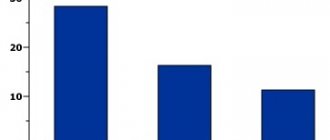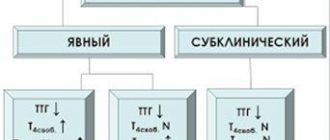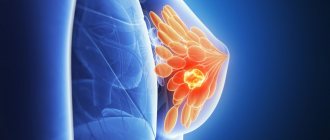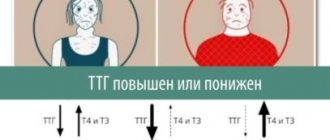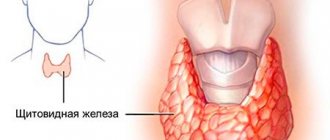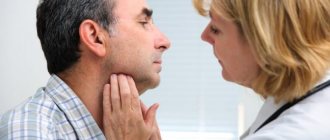General information
There is not a single organ in the human body whose function is not affected by the thyroid gland. She is a kind of “conductor” of metabolism.
The “thyroid gland” is located in front at the bottom of the neck at the level of the 2-3rd ring of the trachea under the larynx, and consists of two lobes connected by an isthmus. The shape resembles a butterfly.
The scientists who first described the gland had an association with the shield, which gave it its corresponding name. The organ is quite small, and in a healthy state it is practically invisible to the person himself.
What is the thyroid gland responsible for?
The thyroid gland is an important organ of the endocrine system.
It produces iodothyronine hormones (also known as thyroid hormones), which participate in catabolic processes and regulate many vital parameters of the body. For example: blood pressure, heart rate, respiratory rate.
Reference! Catabolism is the process of breaking down complex substances into simpler ones, which occurs with the release of energy. Catabolic processes include processing food or burning fat cells.
The organ indirectly affects vascular tone, cell and tissue regeneration processes. We can say that the gland is responsible for the entire metabolism of the human body.
Thyroid gland – hormones
The thyroid gland secretes polypeptide iodine-containing hormones: triiodothyronine (T3) and thyroxine (T4), which are produced by its follicular cells. The command for their secretion is the release of thyroid-stimulating hormone (TSH) by the pituitary gland. Another hormone, calcitonin, regulates the metabolism of calcium and phosphorus. It is extremely important for healthy bone metabolism.
To effectively produce hormones, the thyroid gland needs iodine and the amino acid tyrosine. The human body receives all this from food.
Subtypes of thyroiditis
There are four main subtypes of thyroiditis. This:
- Subacute granulomatous thyroiditis
. This is the most common form of subacute thyroiditis. Its cause is mainly a viral infection. - Postpartum thyroiditis
. This form of thyroiditis develops about a year after birth and lasts an average of 18 months. The cause is an autoimmune disorder. The clinical manifestation is usually divided into two phases: first with symptoms of hyperthyroidism, then with hypothyroidism. - Lymphocytic thyroiditis.
This form of thyroiditis is most often observed after childbirth. Symptoms of hyperthyroidism appear soon after (about 3 months after birth). - Palpable thyroiditis.
Its development is caused by mechanical irritation of the thyroid follicles, which may result from frequent examination and surgical intervention.
All subtypes of thyroiditis have a similar tendency towards a clinical course that begins with a phase of hyperthyroidism and ends with a phase of hypothyroidism. The differences depend on the cause.
Thyroid diseases
Thyroid diseases can be divided into 2 types:
- Primary – the cause and pathological process are located in the gland itself.
- Secondary – the hormonal function of the pituitary gland is disrupted, the secretion of thyroid-stimulating hormone (TSH) changes, which in turn affects the functioning of the organ.
The dysfunction of the endocrine organ can be judged by the results of a blood test for thyroid hormones. It is also necessary to determine the amount of thyroid-stimulating hormone. Ultrasound of the thyroid gland (in some cases with Doppler), scintigraphy and tissue biopsy from suspicious areas are also performed.
Why is the thyroid gland enlarged?
Enlargement of the thyroid gland (hyperplasia) is diagnosed in adults and children based on the results of ultrasound diagnostics. The most common cause is endemic goiter, which is caused by a lack of iodine in the diet. Physiological hyperplasia is often diagnosed in adolescents 13-14 years old. During this period, the body is actively developing, so its need for thyroid hormones increases.
An increase in the size of the gland is also noted with the diagnosis of “diffuse toxic goiter”. The disease is accompanied by inflammation and disruption of hormone production. Ultrasound of the thyroid gland allows you to assess the size of the organ and determine the degree of enlargement.
Thyroid gland: symptoms of the disease
Hypothyroidism
If gland function is reduced, the level of thyroid hormones drops. Accordingly, metabolic processes slow down and the amount of energy decreases. A state of hypothyroidism occurs.
It is characterized by the following symptoms:
- increased fatigue;
- acute sensitivity to cold;
- dry skin;
- excess body weight;
- tissue swelling;
- hoarse voice;
- high cholesterol in the blood;
- muscle weakness;
- slow heartbeat;
- dry, brittle hair;
- memory impairment, forgetfulness;
- depression.
To correct the condition, tablets of thyroid hormones and other drugs are used. Timely treatment restores the body's condition to normal.
How does the thyroid gland affect the nervous system?
With hypothyroidism, weakness, drowsiness, decreased performance and sexual desire are noted. The patient experiences lethargy and apathy, loses interest in life. The symptoms of hypothyroidism are similar to the signs of depression, so before visiting a psychotherapist you should get tested for thyroid hormones.
Hyperthyroidism also affects the nervous system. The person becomes overly excitable and irritable, experiences mood swings, and has problems falling asleep. Against the background of general nervousness, there is an increase in activity and faster speech.
Hyperthyroidism
If the secretion of thyroid hormones exceeds the norm, another pathological condition develops - hyperthyroidism. Its second name is thyrotoxicosis. In this case, metabolic processes are pathologically accelerated, and an inadequate release of energy occurs from the body.
Symptoms of hyperthyroidism:
- sudden weight loss without dietary restrictions;
- tachycardia, arrhythmia;
- tremor of the hands, tremors in the limbs;
- sweating;
- feeling of heat for no external reason;
- an increase in the size of the thyroid gland, its swelling;
- Graves' ophthalmopathy (bulging eyes);
Therapy for thyrotoxicosis is aimed at suppressing the function of the gland.
It is also important to start treatment on time to avoid extreme exhaustion of the body.
Depending on gender and age, the manifestations of diseases may differ.
Thyroid gland - symptoms of dysfunction in men
Hypothyroidism:
- erectile disfunction;
- decreased sperm count;
- male infertility;
- gynecomastia (female breast enlargement);
- reduced endurance;
- slow movements;
- dry eye syndrome, corneal damage;
- holding your breath during sleep (apnea);
- snore;
- insomnia;
- Difficulty waking up in the morning, drowsiness in the 2nd half of the day.
Hypothyroidism is more severe in men than in women. It has a stronger effect on performance, but less influence on the emotional state.
Hyperthyroidism:
- increased excitability, irritability;
- attacks of fear, panic (panic attacks);
- fast fatiguability;
- headache;
- tachycardia and cardiac arrhythmia (more pronounced than in women);
- heart failure;
- decreased potency.
Symptoms in women
Hypothyroidism in women occurs somewhat differently than in men:
- weight gain is more pronounced, weight gain is not stopped by dieting;
- chronic fatigue is observed;
- chilliness;
- hair loss;
- dryness, flaking of the skin;
- constipation;
- memory impairment;
- menstrual irregularities, it becomes irregular, accompanied by painful menstruation.
All postmenopausal women experience a mild degree of hypothyroidism, but it is not clearly expressed. However, it is still worth contacting an endocrinologist. A small medicinal correction of metabolism will restore good health and mood.
Hyperthyroidism in women:
- bulging eyes (more pronounced than in men);
- sleep disorders;
- feeling of constant anxiety;
- menstrual irregularities, it becomes irregular and painful;
- rapid pulse;
- sudden weight loss;
- changes in blood pressure, most often hypertension.
The disease also causes moral suffering to representatives of the fairer sex. This is caused by a clear change in appearance for the worse. To avoid serious consequences, treatment should be started as early as possible, and not wait until the disease strikes a blow to beauty and health.
Manifestations in children
In infants, hypothyroidism is severe and affects the development of the child. Observed;
- swelling;
- excess body weight;
- puffy face;
- developmental delay.
In children of preschool and school age, hypothyroidism manifests itself as follows:
- swelling of the lower extremities and face appears;
- overweight;
- difficulty breathing through the nose;
- rough voice;
- poor circulation in the extremities, cold feet;
- chilliness;
- Delayed change of teeth.
Hyperthyroidism (thyrotoxicosis) in children has its own characteristics:
- frequent and causeless increase in body temperature;
- excitement, hyperactivity, followed by lethargy;
- sudden weight loss, extreme thinness.
If medical assistance is not provided on time, serious problems with the cardiovascular system are possible.
The thyroid gland plays an important role in the development of a child; it is important to diagnose the disease in time and begin treatment.
Treatment stories
Nodular goiter
Patient V., 45 years old. I contacted the EXPERT Clinic with ultrasound data of the thyroid gland. There were no complaints about my health. I went to get examined “in company” with a friend. The patient’s family has no relatives suffering from thyroid pathology. The first ultrasound revealed multiple very small changes in the gland tissue, 3-6 mm in diameter, described by the ultrasound specialist as “multiple nodes”. The patient underwent a blood test for thyroid hormones; no abnormalities were found in the laboratory test data. The patient was offered dynamic monitoring (ultrasound monitoring) every six months, which the patient did. I came to the appointment with five ultrasound reports, which revealed no changes in the size of the lesions in the thyroid gland. However, a dynamic examination was recommended by the ultrasound specialist.
Important! The “nodes” identified in this patient in the thyroid gland, which do not have negative dynamics, do not require any treatment or monitoring over time. These are incidental findings that have no clinical significance.
Patient I., 32 years old. She didn’t complain about her health. She was referred to an endocrinologist after a clinical examination, during which the therapist suspected a nodule in the thyroid gland. Upon examination, the nodular goiter was confirmed - a node 12 mm in diameter with unclear contours and increased blood flow inside. The hormonal function of the gland was not impaired. A biopsy of the node was performed, which revealed a suspicion of thyroid cancer. The patient was operated on (the gland and partially lymph nodes in the neck were removed). Subsequent histological examination confirmed the diagnosis of cancer, and additionally revealed metastases to the lymph nodes. The patient required further treatment - radioiodine therapy. Currently, the patient is receiving treatment and is under the dynamic supervision of an endocrinologist and oncologist. There is no data on the progression and return of the disease after 2 years. Subsequently (after 3 years), making sure that the disease has not returned, the patient plans a pregnancy.
Important! Timely diagnosis and treatment allow the patient to be adequately treated, giving him a good chance of recovery.
Hypothyroidism
Patient M., 20 years old. Over the course of 3 years, he gradually and steadily gains weight. Notes swelling on the face, hands, legs, and abdomen. During all this time, incessant constipation bothered me. The skin became pale, with a yellowish tint. The patient is a third year student at the institute. I began to study worse, because... Attention and the ability to remember have deteriorated; it has become difficult to assimilate a large amount of information, although previously studying was easy. I tried to study more. All the described complaints - especially weight changes, swelling and constipation - were associated with the fact that she leads a predominantly sedentary lifestyle. I tried to use “various diets” to lose weight. They did not bring any significant effect. To normalize stool, she used laxatives and enemas. I went to the student clinic. The examination revealed a reduced level of hemoglobin. Iron supplements and vitamin supplements were prescribed, but there was no significant effect from the treatment. I contacted the EXPERT Clinic. The examination revealed hypothyroidism due to autoimmune thyroiditis. The patient was prescribed treatment, all symptoms of the disease disappeared within 3 months.
Important! Hypothyroidism in adults, most often occurring against the background of autoimmune damage to the thyroid gland, is a common disease. It is easy to diagnose and easy to treat. The main thing is to make a diagnosis in time and choose the right treatment. The patient’s quality of life will depend on this.
Diffuse toxic goiter
Patient N., 32 years old. I contacted the EXPERT Clinic with complaints of tearfulness, mood instability, and increased irritability. She became conflicted with her family and work colleagues. I was concerned about increased sweating and trembling of the hands - both under nervous stress and at rest. I began to notice frequent loose stools; weight loss. All these changes occurred within 3-4 months. The patient herself indicated that her health deteriorated soon after a traumatic situation in the family. With the above-described complaints, the patient turned to the therapist at the clinic, where a diagnosis of “disorder of the autonomic nervous system” and “irritable bowel syndrome” was established. I contacted a gastroenterologist, then a neurologist at the EXPERT Clinic. Upon examination, a possible pathology of the thyroid gland was immediately suspected. During the examination, hyperthyroidism (Graves' disease) was detected for the first time and confirmed. With timely treatment, the patient’s condition completely returned to normal. Gastroenterological and neurological treatment was not even required. Currently, the patient continues treatment and feels well. He is under the supervision of an endocrinologist (curator) who carries out treatment correction. The patient is satisfied with the supervision, the opportunity to consult and receive advice in case of any alarming changes in well-being, and has complete information about the treatment and prognosis of her disease.
Important! Timely diagnosis of thyroid disease allows you to prescribe treatment as soon as possible, without waiting for a pronounced effect on other body systems.
Thyroid goiter: symptoms
A goiter is a pathological growth of thyroid tissue. Often, a goiter does not cause significant pain and only causes discomfort when it reaches a large size.
The disease is accompanied by the following symptoms:
- tightness in the throat and difficulty swallowing, there may be a sensation of a foreign body;
- brittle hair, nails and bone fragility;
- an increase in the size of the thyroid gland until visual manifestation;
- heart rhythm disturbances, tachycardia, arrhythmias;
- hand tremors;
- ophthalmopathy (bulging eyes);
- increased fatigue and decreased performance;
- sleep disorders;
- menstrual cycle disorders in women;
- problems with potency in men.
Goiter usually leads to thyrotoxicosis.
Symptoms of different types of goiter
Depending on the location in the tissues of the organ, goiter can be diffuse or nodular:
- Diffuse toxic goiter (Graves' disease, Graves' disease). It is expressed in a uniform increase and proliferation of tissues. The growth is usually accompanied by increased secretion of hormones and the patient develops hyperthyroidism (thyrotoxicosis).
- She has an evil toxic goiter (Plummer's disease). In this case, small areas of the organ grow and change their structure. Often occurs due to iodine deficiency in the body.
Cystic is also classified as a more advanced form of nodular goiter.
A mixed type of goiter may form: diffuse-nodular , when the entire gland grows, but structurally separate nodes appear in it.
The nature of therapy depends on the type of goiter. In difficult cases, or when medications do not help, surgery is prescribed.
How does the thyroid gland hurt?
Pain is one of the main signs signaling the appearance of pathology. For most thyroid diseases, this symptom is not typical, which makes diagnosis difficult. Disturbances in the functioning of the gland can manifest themselves as increased fatigue and irritability, changes in heart rate, fluctuations in blood pressure, weight changes and other signs. Up to 60% of people with thyroid diseases are unaware of their presence until a thyroid ultrasound and hormone analysis are performed.
Problems with the thyroid gland may be accompanied by the following symptoms:
- fatigue, tiredness, weakness;
- sudden fluctuations in weight;
- dry skin, brittle nails, hair loss;
- memory impairment;
- muscle pain, cramps;
- stomach problems;
- high blood cholesterol levels.
Could it be that the thyroid gland hurts? The pain is not necessarily caused by a problem with this organ. Unpleasant sensations in the neck area are often caused by cervical osteochondrosis and pathologies of the ENT organs. Thyroid pain can occur with subacute thyroiditis, an inflammation caused by a viral infection. The disease is accompanied by an increase in temperature and a deterioration in general well-being.
Another reason why the thyroid gland hurts is nodular goiter. With this pathology, the organ can significantly increase in size, which leads to compression of the respiratory tract.
Thyroid tumors
Thyroid tumors are divided into two classes: benign and malignant.
Benign ones include follicular, clear cell and papillary adenomas. Such neoplasms grow slowly and do not metastasize to other organs. Basically, they do not synthesize hormones, they simply lead to the proliferation of gland tissue. In some cases, a benign hormone-synthesizing tumor occurs, one of the symptoms of which is thyrotoxicosis due to hypersynthesis of hormones.
The cells of benign neoplasms are similar to the cells of the organ itself.
They are less aggressive than malignant ones and only threaten with mechanical deformation of surrounding tissues, difficulty breathing and swallowing. Excess tissue is removed surgically.
Malignant neoplasms include: papillary, follicular, squamous cell carcinoma and lymphoma.
Does the thyroid gland affect weight?
Weight change is the first sign by which thyroid pathology can be suspected. With hypofunction, body weight begins to gradually increase against the background of decreased appetite. Lack of hormones slows down internal metabolism, leading to fluid retention.
Excessive production of thyroid hormones accelerates metabolic processes. A person begins to lose weight even with sufficient calorie intake and without increasing physical activity. With hyperthyroidism and thyrotoxicosis, many patients note an increase in appetite.
Thyroid cancer
The occurrence of a malignant neoplasm is preceded by a genetic mutation of the cell. After which the “mutant” cell multiplies exponentially and forms a cancerous tumor. Its aggressiveness depends on the type of tumor.
Signs of thyroid cancer:
- cough without cold symptoms;
- hoarseness of voice;
- attacks of suffocation;
- an increase in the size of the cervical lymph nodes;
- difficulty swallowing;
- dyspnea;
- weakness;
- sweating;
- weight loss.
For cancer, depending on its stage, organ-preserving operations are used or radical removal of the entire gland and nearby lymph nodes is performed.
After surgery to remove the tumor, chemotherapy and immunotherapy, and treatment with radioactive iodine are prescribed.
Is a lump in the throat a symptom of thyroid?
An enlarged thyroid gland can create a feeling of a lump in the throat. At the initial stage of goiter development, there may be no visual signs. During the examination, the doctor palpates the neck, assesses the size of the lobes and isthmus of the gland. If you experience pain, discomfort when swallowing, or turning your head, you should do an ultrasound of the thyroid gland and be examined by a neurologist or otolaryngologist. Comprehensive diagnostics allows us to identify the exact cause of ailments.
Treatment of thyroid diseases
Drug treatment: drugs are prescribed whose action corrects the amount of thyroid hormones, and in some cases helps restore organ function.
If medication is not enough or is ineffective, surgical removal of part of the gland is performed. In rare cases, the entire gland is removed. If the gland is partially removed, its hormonal function is restored to a large extent.
If the organ is completely removed or its function cannot be restored, the patient receives hormone replacement therapy for life.
Since the thyroid gland affects all other systems of the body, it is recommended to consult not only an endocrinologist, but also other specialized specialists: a cardiologist, neurologist, ophthalmologist, urologist, gynecologist or andrologist.
Why is the thyroid gland reduced?
A decrease in organ size is observed in patients who have undergone surgery to remove part of the gland. Hypoplasia can be congenital. Against the background of iodine deficiency, a pregnant woman experiences underdevelopment of the gland in the fetus.
The most common cause of acquired hypoplasia is called autoimmune thyroiditis. When the thyroid gland is hyperfunctioning or the dosage of a hormonal drug is incorrectly selected, the development of organ cells is suppressed. Due to atrophic processes, its size decreases.
CJSC "ENDOCRINOLOGICAL CENTER"
Rice. 1 - Location of the thyroid gland in humans
EUTHYROID GOITER
Euthyroid goiter (endemic goiter) is an enlargement of the thyroid gland, with normal hormone levels.
Why does the thyroid gland enlarge?
The fact is that the thyroid gland produces two hormones: triiodothyronine (contains 3 iodine molecules) and thyroxine (contains 4 iodine molecules). Iodine is a trace element that is not produced in the body, so we must get it daily. Therefore, no iodine means no hormones, little iodine means few hormones. However, our body requires as many hormones as it should, otherwise disturbances in all metabolic processes (protein, carbohydrate, fat, water, etc.) begin. When there is a deficiency, stimulation of the thyroid gland function by TSH (thyroid-stimulating hormone, which is produced by the pituitary gland) is triggered, as a result of which, by increasing the size of the thyroid gland, a relative stabilization of hormone production is achieved.
Rice. 2 - Enlarged thyroid gland
Why is iodine deficiency dangerous?
According to WHO (World Health Organization), populations living in regions with iodine deficiency have iodine deficiency diseases. These are dysfunctions of the immune system, autoimmune diseases of the thyroid gland, among children - an increased frequency of colds, a higher percentage of children with decreased mental abilities, and the birth of children with congenital hypothyroidism. The most socially significant iodine deficiency disease is a decrease in the intellectual potential of the population in regions where goiter is endemic, etc.
With prolonged iodine deficiency, so-called hypothyroxinemia develops, i.e. decrease in hormone levels during physical and emotional stress, pregnancy, viral diseases, etc. With hypothyroxinemia, thyroid function decreases, which leads to:
- Frequent colds and viral infections, their more severe course;
- During puberty, the thyroid gland enlarges and nodular goiter forms;
- Menstrual dysfunction, both in adolescence and in adult women, hormonal dysfunction in both women and men; during pregnancy, it negatively affects the development of the brain in the fetus;
- Development of autoimmune thyroid diseases.
Research by world scientists has proven that the role of maternal thyroid hormones in the early stages of pregnancy plays a large role in the formation of the intelligence of future offspring. According to scientific research, indicators of mental development of children living in conditions without iodine deficiency are 15-18% higher than in iodine-deficient conditions. In this regard, it is believed that long-term living of people in conditions of iodine deficiency (if the population does not take additional iodine in the form of iodized salt or iodine preparations) leads to a slow decline in the level of intelligence of the entire population living in a given area.
What kind of prevention should be done to prevent iodine deficiency diseases?
In conditions of goiter endemia it is necessary:
- Preventive intake of iodine daily and constantly, regardless of the time of year and other factors! This is iodized salt or preparations containing prophylactic doses of iodine (sometimes both).
- Ultrasound of the thyroid gland, taking into account the correct assessment of the tissue structure and nodular formations. However, the size of the thyroid gland is assessed by a doctor by palpation, since the volume of the thyroid gland by ultrasound does not (often) correspond to the size of the examined thyroid gland by palpation. These conclusions were made at the congress on thyroid diseases in Moscow.
- Determination of thyroid hormones and evaluation of results by an endocrinologist.
- Observation and treatment in case of detection of iodine deficiency diseases (doctor's recommendations).
Is there iodine deficiency in the conditions of the Irkutsk region?
Almost the entire territory of Russia belongs to regions with insufficient iodine content in the environment. Studies have shown that the actual average iodine intake currently ranges from 40 to 80 mcg per day, which is 3 times less than the recommended amount.
The Irkutsk region belongs to an iodine-deficient region. There is no iodine in Baikal water, and, consequently, in the Angara, and in the plants that grow on our land.
Until now, iodized salt is not regularly available in stores and only a small part of the population uses it. In this connection, mass iodine prophylaxis should be organized: only iodized salt is on sale and, in addition, iodization of other products (bread, dairy products).
In the absence of such conditions, we need to take medications with a prophylactic dose of iodine - iodomarin, iodine balance. For adults, 200 mcg of iodine per day is enough. Remember, these doses of iodine prophylaxis are completely harmless and do not accumulate in the body. Iodomarin, the iodine balance in these doses, can be considered to provide those doses of iodine that we could replenish with iodized salt. Therefore, these drugs can be taken at any age and for any form of goiter (diffuse, nodular).
Daily iodine requirement
| Groups of people | Iodine requirement (mcg/day) |
| Preschool children (0-59 months) | 90 |
| School age children (6-12 years old) | 120 |
| Teenagers over 12 years old and adults | 150-200 |
| Pregnant and lactating women | 250 |
There is an opinion that in case of nodular forms of goiter over the age of 60 years, taking iodomarin is contraindicated. Let's imagine that we have iodine prevention of goiter (as in other countries). And the entire population takes iodized salt regularly. If we proceed from the position of far-fetched contraindications, it turns out that people with nodular goiter and over 60 years of age should not consume iodized salt? Of course not!
In our country, only 30% of the population consumes iodized salt, so in our country it is important to use pharmaceuticals containing (unlike dietary supplements) a strictly defined amount of iodine (for example, iodomarin, iodine balance).
Iodomarin, iodine balance are undesirable in persons with thyrotoxicosis and in persons who have low levels of thyroid-stimulating hormone. These issues should be discussed with your doctor.
The use of iodine solutions and various ointments with iodine is absolutely contraindicated! since the iodine content in them significantly exceeds prophylactic doses, which can lead to disruption of thyroid function. Consumption of algae also does not provide complete prevention, since there is no specific dosage, and therefore it is impossible to determine the required amount of iodine.
REMEMBER: we need thyroid hormones from birth to old age if we want to maintain our intelligence! Therefore, recommendations that preventive doses of iodine should not be taken after 50-60 years are unacceptable in the conditions of our region!
NODUAL GOITTER
It is currently believed that the main cause of nodules in the thyroid gland is a chronic lack of iodine in food. The presence of a sufficient amount of iodine in the thyroid gland blocks growth factors, and therefore nodules rarely form. With a lack of iodine, individual areas of the thyroid tissue grow.
Nodules are benign tumors that have the ability to grow, pushing apart the surrounding thyroid tissue. At the same time, benign cells do not acquire the ability for infiltrative growth (i.e., penetration between thyroid cells), like malignant ones. Benign tumors can cause symptoms of compression of surrounding organs in the patient (for example, compression of the nearby trachea can lead to difficulty breathing), but are not capable of metastasizing, i.e. spread through the bloodstream to other organs.
What should be done when nodular formations are detected?
- Ultrasound of the thyroid gland. When performing an ultrasound, the location, quantity, shape, size and other parameters of the node are assessed.
- Ultrasound-guided fine-needle aspiration biopsy (abbreviated FNA). This procedure answers the question: is the node benign or malignant.
Fig.3. Fine needle aspiration biopsy of the thyroid gland
- Determination of thyroid hormone levels. If thyroid-stimulating hormone (TSH) decreases, it is necessary to perform thyroid scintigraphy. Particular cases of TSH levels depend on the quality of the tests by which it is determined. These tests may not be “sensitive” enough; in these cases, the doctor must evaluate the clinical symptoms and conduct repeated tests.
It should be noted that when benign nodes are identified, dynamic monitoring is required: twice a year, ultrasound of the thyroid gland and determination of thyroid hormones. If the size of the node increases, a repeat puncture biopsy is performed.
Modern approaches to the treatment of nodular forms of goiter (benign):
In case of benign nodular goiter, it is necessary to assess the functional activity of the node, i.e. determination of TSH. If the TSH level is reduced, then it is necessary to exclude the functional activity of the node (carrying out thyroid scintigraphy). If the TSH level is normal, dynamic monitoring of the growth of nodes and taking medications containing preventive doses of iodine (iodomarin, iodine balance) are recommended.
Surgical treatment of benign nodes currently has strict indications. According to international and Russian recommendations for the diagnosis and treatment of nodular goiter, indications for surgery are:
- tracheal compression syndrome established on the basis of CT;
- functional autonomy with manifest or subclinical thyrotoxicosis when treatment with radioactive iodine is impossible;
- a cosmetic defect that reduces the quality of life.
In other cases, surgical treatment is NOT INDICATED!
Malignant nodes are subject to mandatory surgical treatment and, most importantly, timely treatment!
What consequences do we have in the postoperative period (after surgical treatment of benign nodes)?
- Reduction in the size of the thyroid gland and a decrease in its hormonal function, i.e. the development of hypothyroidism, requiring hormone replacement therapy, which will never replace the true hormones produced by the thyroid gland. We must not forget about combination therapy, i.e. hormonal plus preventive doses of iodine, which “feed” the remaining thyroid tissue.
- The growth of nodules can often recur after surgical removal of nodules in the remaining thyroid tissue and even on the remaining “stump,” since the entire thyroid gland “sicks” from nodulation. This is why it is dangerous to operate on benign nodes.
- During surgery, damage to the recurrent nerve is possible, which leads to weakening of the voice, hoarseness, and even complete loss of voice.
- Damage to the parathyroid glands, which regulate the exchange of calcium and phosphorus in the blood. Which, in turn, is accompanied by disruption of metabolic processes in bone tissue and requires replacement therapy.
New methods for treating benign nodes
Significant progress in the technical capabilities of endocrine surgery over the past 30 years has led to the widespread development of ultrasound examination, the introduction of fine-needle aspiration biopsy into practice, and the emergence of techniques that can eliminate problems associated with thyroid nodules without surgery. These techniques are called minimally invasive or interstitial destruction methods.
Among the destruction methods, the most widespread is the use of ethanol sclerotherapy - the introduction of ethyl alcohol into the tissue of the nodes. This method was one of the first to be introduced into clinical practice in the late 80s of the twentieth century by the Italian endocrinologist T. Livrani. The greatest effect was noted from the use of laser (laser-induced thermotherapy).
Interstitial methods are aimed at destroying nodes inside the thyroid tissue and are carried out under ultrasound control. The use of modern ultrasound devices allows the endocrinologist surgeon to work with high precision on the node that is the source of the patient’s problems. The main goal of such treatment is to destroy the tissue of the nodes without damaging the surrounding healthy tissue. Destruction of the node leads to a decrease in its size, and subsequently to the growth of the node, which makes it possible to avoid surgical treatment.
Minimally invasive methods have a number of advantages compared to surgical treatment. Firstly, they allow the patient to avoid surgery and everything associated with it - stress, anesthesia, a scar on the neck, relapse - i.e. the appearance of nodules on the remaining thyroid tissue. Secondly, it allows you to preserve the thyroid tissue surrounding the node, and therefore avoid the occurrence of hormonal deficiency after treatment. Thirdly, many minimally invasive techniques are used on an outpatient basis and without hospitalization, which allows the patient to work during treatment. This treatment is cheaper than surgery.
Minimally invasive techniques have proven to be especially useful for patients in the older age group. The occurrence of nodes in older people is almost normal - after 60 years of life, nodes appear in most people. In many patients, by the age of 70–80, these formations reach significant sizes and lead to complaints.
The main feature of all these techniques is the fact that the thyroid nodule is not removed during treatment. The tissue of the node is destroyed, but the node itself remains in place. After treatment, the volume of the node is usually significantly reduced. However, promising that the node will completely disappear means deceiving the patient. But most importantly, the node does not grow and does not function!
Examples from our practice
- Pregnancy and nodular goiter. Pregnancy, as a rule, stimulates the growth of the node, and therefore laser destruction is indicated.
- Substernal goiter with symptoms of compression, a history of myocardial infarction. The operation is contraindicated. When performing laser destruction, we obtain a reduction in the size of the node and the disappearance of symptoms of compression.
- In the absence of the possibility of proper dynamic observation, which is often the case, laser destruction will improve the situation.
Our center uses minimally invasive treatment methods: sclerotherapy and laser destruction. There is a specialist, Andrey Viktorovich Zybin, who has been trained in central clinics and has a certificate in the use of minimally invasive techniques. Over a long period of work, there are good results from their use.
THYROID AND PREGNANCY (3)
During pregnancy, women develop another so-called “endocrine gland” - the placenta, which creates a certain condition necessary for the development of the fetus. The level of many hormones increases, which, although bound to proteins, create the necessary “depot reserve”.
In women living in conditions of iodine deficiency, the thyroid gland cannot secrete hormones in reserve due to the lack of necessary iodine intake. “Nature,” responsible for the development of the fetus, does not recognize this and takes what the mother has into the depot. Thus, a mother living in conditions of iodine deficiency does not have sufficient amounts of either hormones or iodine, which are necessary for the normal development of the fetus and for her own body. In this regard, stimulation of the thyroid gland with thyroid-stimulating hormone (TSH) and placental hormones begins. What do we get if we do not take additional iodine supplements or thyroid hormones? A woman’s thyroid gland enlarges; if there are nodules, they can also enlarge, new nodes appear, and their malignant degeneration is possible.
Insufficiency of thyroid hormones affects the development of chronic placental insufficiency - a violation of the functional activity of the placenta, which leads to the threat of miscarriage or frozen pregnancy.
In addition, a negative effect of insufficiency of thyroid function on the fetus has been noted: chronic intrauterine hypoxia, disorders of brain formation (from decreased intelligence to cretinism), congenital hypothyroidism, often damage to the central nervous system (hydrocephalus), Down syndrome, etc.
Conclusion: it should be remembered that many disorders of the gonads in conditions of endemic goiter depend on the functional state of the thyroid gland.
Remember: an experienced endocrinologist can evaluate thyroid function based on clinical manifestations. A one-time assessment of hormone levels alone is insufficient and not informative.
When planning a pregnancy in conditions of endemic goiter (i.e., iodine deficiency, which exists in the Irkutsk region, Buryatia and other regions), it is necessary:
- Detailed examination of thyroid function
- Ultrasound diagnostics by highly qualified specialists who know all the intricacies of the thyroid structure in the presence of goiter and other thyroid diseases
- Determination of hormones
- Consultation with an endocrinologist with clinical experience in order to correctly assess ultrasound data and hormone levels (to exclude hypothyroxinemia - “hidden” symptoms of thyroid dysfunction)
- Dynamic determination of hormones during pregnancy
- Dynamic control over the size of nodular formations, if any
- Monitoring the state of the cardiovascular system in the presence of thyroid diseases Consequently, iodine deficiency during pregnancy leads to pathological changes, characterized by a decrease in the level of hormones and iodine in both the mother and the fetus and, accordingly, to obvious pathological disorders. The functioning of the thyroid gland in the fetus is completely dependent on the supply of iodine and hormones from the maternal body. With iodine and hormone deficiency, the function of the fetal thyroid gland is disrupted, which leads to disruption of the child’s brain formation (from decreased intelligence to cretinism), personality formation, damage to the central nervous system, etc.
HYPOTHYROIDOSIS (decreased thyroid function) (4)
Hypothyroidism affects all types of metabolism: protein, water, carbohydrate, fat. Characterized by damage to connective tissue (joint pain, osteoporosis, etc.), fluid retention (edema, increased blood pressure), inhibition of the function of the central nervous system, adrenal glands, and gonads. The development of mastopathy is possible. In children and adolescents – growth retardation, impaired physical and sexual development: menstrual dysfunction in girls, delayed sexual development in boys. Long-term hypothyroidism leads to an increase in prolactin levels and the development of a pituitary tumor, a decrease in the hormonal function of the adrenal glands, etc.
Causes of hypothyroidism:
- Lack of iodine in the body
- Endemic goiter
- Surgical interventions on the thyroid gland
- The most common cause is autoimmune thyroiditis
Autoimmune thyroid diseases are associated with dysfunction of the immune system due to iodine deficiency. Immune system disorders are accompanied by the formation of substances (antibodies), which in some cases “kill” the cells of the thyroid gland and autoimmune thyroiditis (AIT) develops with insufficiency of the thyroid gland (i.e. hypothyroidism). As a result, we have both non-functioning cells and preserved ones, which require the presence of iodine in the body to function.
Diagnostics:
Often, patient complaints may be the only symptoms of the disease:
- Fatigue
- Lethargy
- Drowsiness (more often during the day)
- Decreased physical or mental activity
- Decreased performance
- Memory loss
- Mood changes
With hypothyroidism, many body systems are damaged: the cardiovascular, nervous system, musculoskeletal, excretory and others.
From the nervous system: perception and attention decrease, mental activity slows down, mood lability, at times there is a feeling of fussiness, internal tension, increased sensitivity, vulnerability. I feel especially bad in the morning - a feeling of inner emptiness and heaviness. In contrast to neuroses, patients often complain of difficulty articulating, awkward movements, heaviness in the muscles, bones, and joints. With a slower progression of the disease, the following is noted: a tendency to conflicts, increased excitability - patients become “grumpy”, “angry”, and a quarrelsome character appears. Mental disorders progress, which are expressed in slowing down and difficulty in mental functioning.
Patients note weight gain, increased sensitivity to cold, voice changes, and menstrual irregularities. Dermatological symptoms are characteristic: hair loss, alopecia, dry skin, hyperkeratosis, nail damage. Therefore, any disease of the skin or hair requires examination of the function of the thyroid gland.
The disease can occur atypically or with minor symptoms, for example, with a predominance in the clinic of any group of symptoms: edema, cardiac symptoms, symptoms of the nervous system or psyche, muscle weakness.
The variation of symptoms can be varied. Patients are often treated by many specialists without knowing about their disease.
Remember! You live in conditions of iodine deficiency - it is necessary to periodically check the function of the thyroid gland. But this should be done not on the basis of the conclusion of an ultrasound diagnostic doctor, but of an endocrinologist.
Hypothyroidism in children: The clinical picture of hypothyroidism in children depends on age. For newborns it is typical: weight more than 4 kg, the child sucks poorly at the breast, lethargy, difficulty in nasal breathing, delayed mental development. At an older age: delayed physical and mental development, stunted growth (especially pronounced at 3-4 years).
Treatment of hypothyroidism consists of taking thyroid hormone drugs, but not as a treatment, but as a replacement for the deficiency of hormones that “did not supply” the damaged thyroid cells, plus necessarily preventive doses of iodine for the functioning of the cells. In children, the earlier treatment is started, the more reliably intellectual development will be preserved.
The course of the disease is progressive, which requires long-term observation and dose adjustment of hormones.
DIFFUSE TOXIC GOITER
Another autoimmune disease includes diffuse toxic goiter. With this disease, antibodies are formed that stimulate the functioning of thyroid cells; as a result, thyroid hormones are synthesized in excess and enter the blood. This condition is called thyrotoxicosis. Characteristic symptoms of thyrotoxicosis: increased excitability, palpitations, sweating, weight loss, trembling in the hands and body, and in older people - an unreasonable disruption of the heart rhythm.
Rice. 5. Symptoms of thyrotoxicosis
Treatment. There are three methods of treating this disease: this is the prescription of drugs that “block” the production of thyroid hormones; surgical treatment; radioactive iodine therapy.
It is necessary to take this disease seriously, since violation of the drug regimen, inaccessibility of frequent monitoring by an endocrinologist, long-term treatment (continuity of treatment for up to a year), and unreasonable combination of treatment with drugs that block the function of the thyroid gland with thyroid hormones leads to frequent relapses of the disease.
SUBACUTE THYROIDITIS (5)
The provoking factor is infection. Clinical picture: pain in the neck (usually in the thyroid gland) radiating to the back of the head, upper and lower jaw, high temperature, etc.
Rice. 6. Clinical picture of subacute thyroiditis
Treatment is the use of adrenal hormones (prednisolone).
We have developed a technique (Zybina V.D.) - local administration of hormones, which allows the use of small doses of hormones and a short period of treatment.
OPHTHALMOPATHY OR POGGY EYES
Rice.
7. Clinical picture of ophthalmopathy Often develops against the background of thyroid diseases.
An examination by an endocrinologist is necessary.
Zybina V.D. Associate Professor, Ph.D.
Complications
Surgical treatment helps to get rid of a nodular goiter suspicious for a malignant process, but is associated with complications, infrequent, but nevertheless unpleasant:
- damage to the laryngeal nerve with subsequent hoarseness,
- removal of the parathyroid gland responsible for calcium metabolism,
- relapse of goiter.
The frequency of complications is affected by the size of the enlarged gland; the larger, the more likely it is. However, the incidence of complications does not exceed one percent.
But the most common complication of surgery and radioactive iodine is insufficiency of endocrine function, that is, a decrease in the level of thyroid hormones below the critical level, which is compensated by lifelong use of hormonal drugs.
Goiter prevention
There is no region in Russia where the population does not experience iodine deficiency, so the consumption of iodized products, primarily salt, is very important for the health of the thyroid gland. In endemic areas, it is useful to take iodine preparations; for an adult, 120 mcg of iodine is needed daily, for pregnant and lactating women - 250 mcg.
Surgeries on the neck organs require extensive surgical experience and technical virtuosity; the surgeons and oncologists of our clinic have created all the conditions for high-quality care for our patients.
Book a consultation 24 hours a day
+7+7+78

